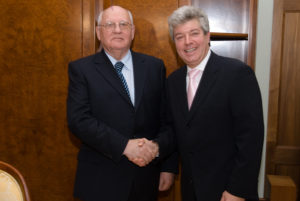
Received wisdom is that the Cold War ended in the early 80s, when Ronald Reagan announced his Strategic Defensive Initiative (SDI, Star Wars Initiative). It was a quantum leap in nuclear defence and light years ahead of Soviet weapons technology.
The impact was such that it forced the Russians to reconsider their strategic defence; we all know what happened next and ultimately, they ‘threw in the (radioactive) towel’.
However, there is a problem. It is not quite the truth.
I was privileged to hear what really happened from President Gorbachev himself, since he was our guest of honour at a function to celebrate Glentree’s forty-odd years of trading.
The President was quite emphatic that it was the ‘sycophantic relationship and strategic alliance’ between Saudi Arabia and the USA that resulted in low oil prices. This was a deliberate strategy to deplete the Soviet Union of their vital foreign earnings, since the ravages of Communism meant that energy was their only meaningful export at the time.
I suspect that his modesty prevented him from admitting that he was a visionary who could see the writing on the proverbial. Although this had debilitated the Soviet Union, he embraced Perestroika and the rest, as they say, is history. In his speech he declared that he would have preferred the former Soviet Union satellite countries to become a federation of democratic states rather than the disorderly concoction presided over by his successor, the dipsomaniac President Yeltsin.
It’s reasonable to assume that if the presiding Soviet leader was in the Khrushchev/ Brezhnev mould, they would have continued to compete with America despite the suffocating effect on their economy and the welfare of their people.
In the 80s the Soviet Union was one of the largest energy producers in the world, which comprised the vast majority of their GDP.
When viewed from today’s perspective, it explains the symbiotic Saudi-USA relationship and Trump’s reluctance to be overly hostile towards Mohammed Bin Salman (MBS) over the ‘Ealing Comedy’ of Jamal Khashoggi’s abduction and murder at the Saudi Embassy in Turkey.
Although the world seeks to wean itself off oil, nevertheless, it is still a vital energy product and ergo, political tool. Saudi Arabia sits atop one of the largest reserves on the planet. Ignoring Trump’s idiosyncratic presidential house style for a moment; decisions such as his rejection of the Paris Accord, encouragement of offshore drilling, Alaskan pipeline activity and launch of fracking projects demonstrate a game plan to make America self-sufficient in energy and the largest energy producer in the world.
There are several advantages, not least of which would be the tremendous soft power wielded by the US. The huge influence on global energy supply means that America could, for example, offer either China a low price or Russia a high oil price. Other countries would be relieved of their dependence on Saudi Arabia and maybe not so tolerant of the Kingdom’s incursions into Yemen or the blockade against Qatar.